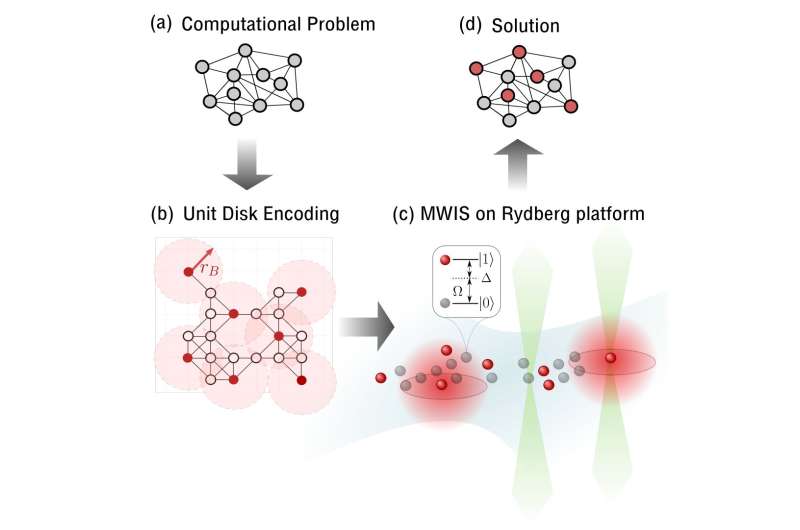This article has been reviewed according to Science X's editorial process and policies. Editors have highlighted the following attributes while ensuring the content's credibility:
fact-checked
preprint
proofread
Encoding breakthrough allows for solving wider set of applications using neutral-atom quantum computers

QuEra Computing, maker of the world's first and only publicly accessible neutral-atom quantum computer—Aquila—today announces its research team has uncovered a method to perform a wider set of optimization calculations than previously known to be possible using neutral-atom machines.
The findings are the work of QuEra researchers and collaborators from Harvard and Innsbruck Universities: Minh-Thi Nguyen, Jin-Guo Liu, Jonathan Wurtz, Mikhail D. Lukin, Sheng-Tao Wang, and Hannes Pichler.
"There is no question that today's news helps QuEra deliver value to more partners, sooner. It helps bring us closer to our objectives, and marks an important milestone for the industry as well," said Alex Keesling, CEO at QuEra Computing. "This opens the door to working with more corporate partners who may have needs in logistics, from transport and retail to robotics and other high-tech sectors, and we are very excited about cultivating those opportunities."
Programmable quantum systems, such as the kind QuEra provides, offer unique possibilities to test the performance of various quantum optimization algorithms. However, there can be limitations to this which are often set by particular hardware restrictions. Specifically, the native connectivity of the qubits for a given platform often restricts the class of problems that can be addressed. For instance, Rydberg atom arrays naturally allow solving for maximum independent set (MIS) problems, but native encodings are restricted to so-called unit-disk graphs.
The paper's findings significantly expand the class of problems which can be addressed with Rydberg atom arrays by overcoming the limitations to the aforementioned geometric graphs. Now, new classes of optimization problems can be solved by neutral-atom machines. These include maximum independent sets on graphs with arbitrary connectivity, and quadratic unconstrained binary optimization (QUBO) problems with arbitrary or restricted connectivity.
This additional functionality allows for applications in fields such as logistics scheduling and pharmaceuticals. For example, identifying the most promising candidate components for new pharmaceuticals at an early stage has long been an arduous task. Through QuEra's new encoding method, optimized protein design becomes a possibility.
In this way, machines such as Aquila will be able to support researchers to more efficiently identify the best samples to press on with in trials. This reduces the resources required to get new types of drugs through the development process and enhances the probability of approval. Consequently, makers of pharmaceuticals may see increased revenue and reduced cost.
The breakthrough therefore provides a blueprint for using Rydberg atom arrays to solve a wide range of combinatorial optimization problems using quantum computers of today.
The research is published on the arXiv preprint server.
More information: Minh-Thi Nguyen et al, Quantum optimization with arbitrary connectivity using Rydberg atom arrays, arXiv (2022). DOI: 10.48550/arxiv.2209.03965
Journal information: arXiv
Provided by QuEra Computing





















